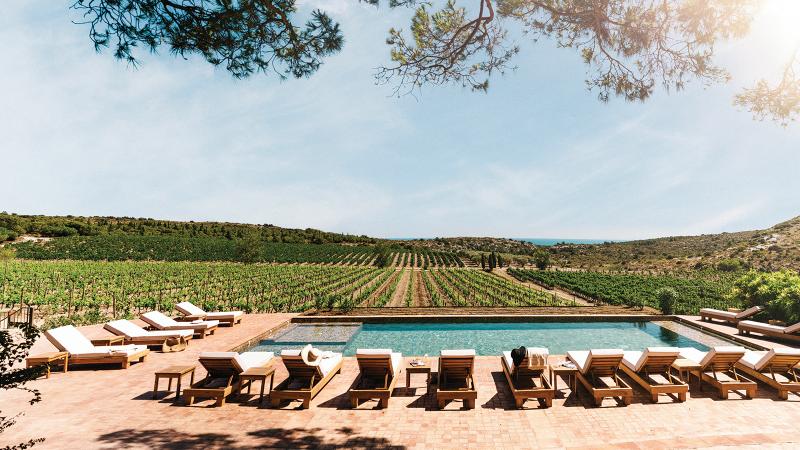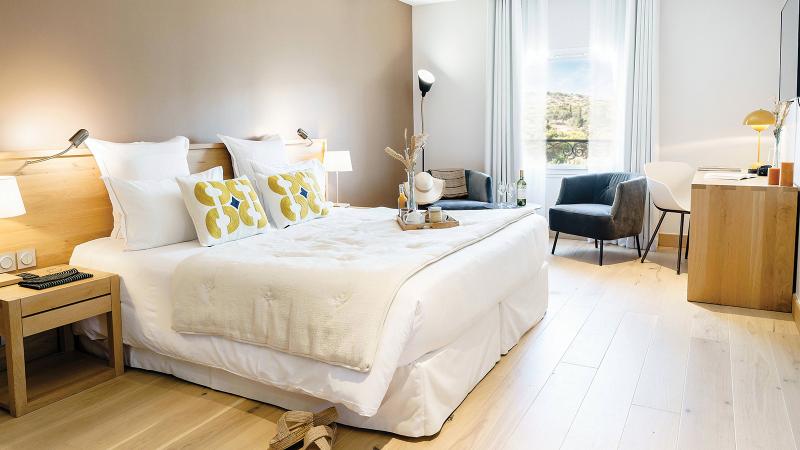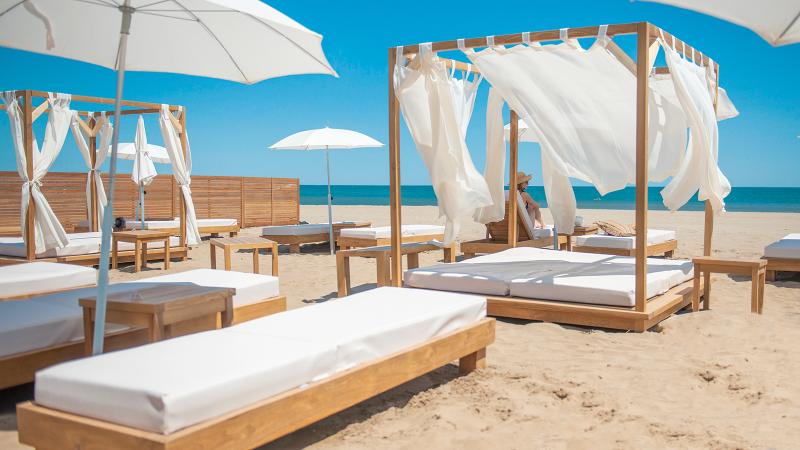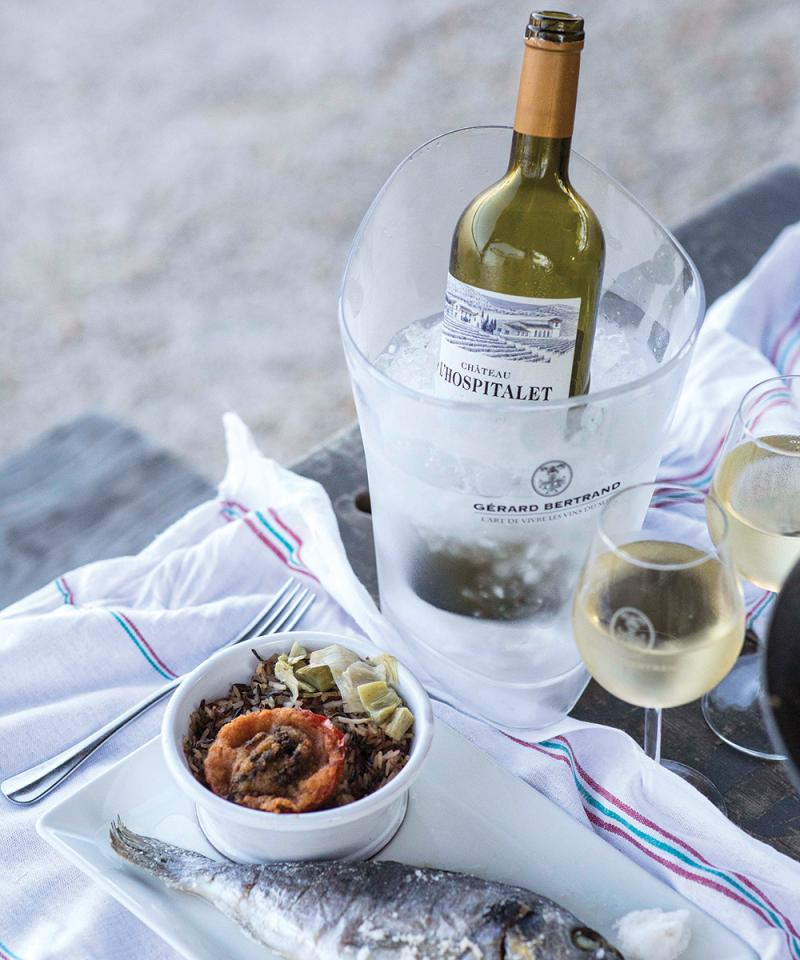There’s a place in southern France, elevated high above the city of Narbonne, that represents the best of mer et terre. From this vantage point, you can gaze over sun-baked vineyards, pine forests and garrigues (scrubland) with the sparkling Mediterranean beyond. Known as La Clape, this limestone massif was an island surrounded by the sea during the days of ancient Rome. Today it’s a protected area of extraordinary natural beauty, and you can actually spend the night. Here at the Château l’Hospitalet, a long-time destination for wine tourism in the Languedoc-Roussillon, you can drink in the views while drinking the wines representative of a distinct maritime-influenced terroir. Best of all? Following a large renovation, Château l’Hospitalet has transformed into a full-scale wine resort, complete with spa, beach club, and luxury suites in the newly built Villa Soleilla.
First a little background. Stretching from Provence to the Spanish border, the Languedoc-Roussillon—now part of the Occitanie region—is one of the world’s largest wine producers. The Phoenicians first planted vines here in the 5th century BC, followed by the Romans who established their first city in Gaul in Narbonne. Over the millennia, a rich wine culture developed in a territory where the geographic situation conspires to create the perfect conditions for winemaking: ample sunshine, a variety of suitable soils, and exposure to the famous Mediterranean winds (for drying out the vines). In fact, the region was so successful at producing wines that in the 19th century it shifted to mass production, favoring volume over quality, exporting vast quantities across Europe. But over the last few decades, the region’s reputation has changed dramatically as innovative winemakers have sought to craft exceptional wines that are expressions of the terroir.

One of these pioneers is Gérard Bertrand. A professional rugby player in his youth, he took over the family’s Corbières vineyard at the age of 22 in 1987 and gradually expanded his holdings, winning awards for great wines throughout his career. Now Bertrand owns 2,100 acres across 16 estates—farmed organically according to biodynamic practices. In 2002, Bertrand acquired Château l’Hospitalet, a domaine with a hospitality tradition dating to the Middle Ages, when pilgrims were welcomed by monks to the hospital on this site. The old motto? “Sine vino, vana hospitalitas” (without wine, vain is hospitality). Retaining this mantra, the hotel was translated into a reflection of the Gérard Bertrand universe and Mediterranean lifestyle with fine dining, a contemporary tasting cellar, art gallery, and events like the popular summer jazz festival.
During the pandemic, Château l’Hospitalet embarked on an ambitious expansion project, immediately resulting in a new five-star rating from Atout France in autumn 2021. The rooms in the original chateau were completely renovated and expanded in size; the 17 suites and 13 superior rooms are spread across three buildings and overlook the gardens or vineyards. Note that some suites come with their own jacuzzi and family suites come with a sofa bed for accommodating children.
But the real novelty can be found uphill in the separate Villa Soleilla, inaugurated in the autumn. An adjacent mas, or farmhouse, was acquired a few years ago with the aim of creating an exclusive hideaway with ultra-luxe suites—connected to the main property by both a walking path and road. From this privileged perch, the Villa Soleilla offers views all the way to the Mediterranean. The complex consists of 11 suites, a stunning infinity pool, and the Spa Soleilla. Done up in earth tones, the suites have a clean, contemporary feel, decorated with wood furniture, travertine tile floors, and sliding glass doors that open onto outdoor decks equipped with sun loungers for soaking up the sun and view. You’re surrounded by the vineyards that produce an exclusive new biodynamic orange wine. (Named Villa Soleilla, the wine is made with grapes harvested by hand and pays homage to the first orange wines made in Georgia 4,500 years ago.) The landscaping is also lovely; the gardens adhere to the estate’s strategy of boosting biodiversity and polyculture, and fighting against soil erosion, by reintroducing fruit trees, truffle oaks, and other species.

The largest and most sumptuous is the Soleilla Suite (more than 1,030 square feet), which comes with a special fridge stocked with exceptional and rare vintages. For VIP booking requests, reach out to the friendly reception team ([email protected]) or General Manager Frédéric Veyrier ([email protected]).
Inaugurated in October, the Spa Soleilla has four treatment rooms, a sauna, and a light-filled relaxation room. The menu is all about personalized rituals; choose a massage with essential oils or facial care with Biologique Recherche, the cult brand adored by celebrities for its results-driven, anti-aging cosmetics and skincare products. (The high-dose formulas contain natural or biotechnological ingredients without perfume.) Therapists must be trained according to the brand’s principles at its Embassy Institute, housed in a private mansion at 32 avenue des Champs-Elysées in Paris. For assistance with bookings, reach out to Spa Manager Prune Berry ([email protected]).
Coming in March: the resort’s gastronomic restaurant L’Art de Vivre will show off a complete makeover and a new concept. Expect an exclusive culinary experience for small groups (a maximum of 25-30 guests per sitting) with wine pairings with each course. Chef Laurent Chabert uses ingredients from his own organic vegetable garden along with herbs he forages on the estate. In the meantime, the resort’s Chez Paul restaurant has a warm, welcoming vibe and a local Languedoc menu featuring seasonal ingredients and fresh-caught fish. The show kitchen adds some theater as diners can watch dishes simmered in casseroles or roasted over a wood fire.

The beauty of wine tourism here in Languedoc is you are not confined only to tasting rooms. The Mediterranean is at your doorstep and there’s a wealth and diversity of activities to complement your interest in wine. You could spend the morning at the nearby Salin de Gruissan where sea salt is harvested by hand, followed by an oyster lunch at the Etang de Thau (a lagoon famous for oyster production), and an afternoon visit of Narbo Via, the stunning new museum dedicated to Narbonne’s ancient Roman history, designed by Foster+ Partners. There are fascinating heritage sites like the 13th-century Tour Barberousse (castle ruins) in Gruissan and the Abbey of Fontfroide, used as a film set by director Ridley Scott in the movie “The Last Duel.” Not to mention the wide sandy beaches, just a 15-minute drive from the resort, where you can hit Hospitalet Beach, the resort’s seasonal restaurant club set up on the sand. Think cocktail bar, day beds with billowing white curtains, and a DJ-led soundtrack. You can even rent a paddleboard or partake in a yoga session.

Of course you might not want to leave the wine resort at all. The Château l’Hospitalet has a tennis court, walking trails, gym, golf putting green, and outdoor swimming pools. But, in adhering to Hospitalet’s motto, what is hospitality without wine? Arrange a tasting session in the cellar (where you can try 90 different types of wine from the Occitanie region), a master class, or tour of the vineyards. Farther afield, a day-long itinerary can be arranged to visit Gérard Bertrand’s other notable estates like the newly built Clos du Temple winery, making waves for its unique rosé wine.
Related Articles
Saint James Paris Unveils Total Renovation
Sonoma County to Host Healdsburg Wine & Food Experience